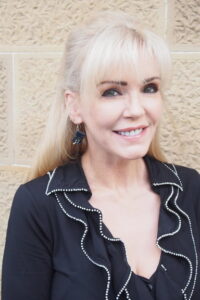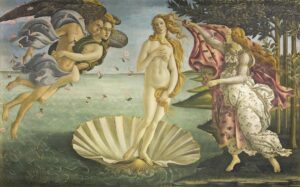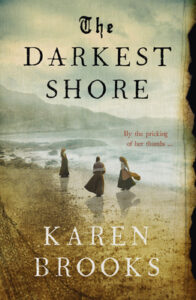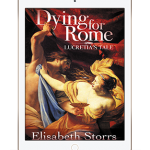 My guest today is the lovely Karen Brooks, author of The Chocolate Maker’s Wife and The Locksmith’s Daughter among many. Karen has had a rich and varied professional life before becoming a full-time writer and the co-owner of a brewery and distillery. She was a professional actor and drama teacher, an officer in the Royal Australian Army Survey Corps; she has a PhD in cultural studies and psychoanalytical theory and was an academic for over 24 years, winning national awards for her teaching. She was also a columnist with the Courier Mail in QLD for 18 years and wrote for many other major publications during that time in Australia, New York and London.
My guest today is the lovely Karen Brooks, author of The Chocolate Maker’s Wife and The Locksmith’s Daughter among many. Karen has had a rich and varied professional life before becoming a full-time writer and the co-owner of a brewery and distillery. She was a professional actor and drama teacher, an officer in the Royal Australian Army Survey Corps; she has a PhD in cultural studies and psychoanalytical theory and was an academic for over 24 years, winning national awards for her teaching. She was also a columnist with the Courier Mail in QLD for 18 years and wrote for many other major publications during that time in Australia, New York and London.
She’s also the author of 13 books. She’s written bestsellers, published in Australia and by William Morrow in the USA and UK. Her latest, set in Scotland in the 1700s, and based on a terrible true story, is The Darkest Shore.
You can connect with Karen via her website, Facebook and Twitter. Buy links to her books are on her Books page.
What or who inspired you to first write? Which authors have influenced you?
The first person to inspire me to write (novels) was Sara Douglass (Warneke). She was one of my closest friends and witnessing her putting her amazing ideas into words, creating fully realised worlds that became fantastical stories and later seeing them in print, was inspirational. To know someone you love did it (plus she was very supportive and encouraging) enabled me to finally give my long-held dream of being a writer of fiction a go.
As for which authors influenced me, that’s a harder answer to give. Without sounding clichéd or like I’m avoiding a direct answer, I think every single author I read influences me. I’m an avid reader across all genres and the pleasure reading gives me, the beauty of what these writers accomplish, whether it be a marvellous historical fiction, a lighter romantic read, the amazing scope of both fantasy and sci-fi, gritty crime, literary works (to me, all works are “literary” in one sense and often give me lexical envy) and erudite, philosophical, educational and amusing non-fiction all influence me. Not only to appreciate the joys of reading, but the craft of writing as well – together, they influence me to hone my craft and be better at telling stories!
What is the inspiration for your current book? Is there a particular theme you wished to explore?
The inspiration for my current book, The Darkest Shore, was two-fold. First, it was learning about the fishwives of Scotland (and other areas of Great Britain) and the work they used to do, some of the prejudices they endured and how resilient and sassy they were. This set me off on a path of learning more about them. I was also travelling to Scotland for a friend’s wedding and some other good friends told me I would not only learn heaps about the fishwives (who, in later decades, came to be known as “Herring Lasses”) but potentially about witchcraft as well, if I stayed in the Fife region in the east. How could I resist? My friends were right on both counts. Upon visiting the Fife coast and in particular, the fishing village of Pittenweem (I was staying in the neighbouring one of Anstruther – both beautiful), I encountered not only the history of fishwives and a functioning fishing village (Pittenweem), but a horrific story of a witch hunt and the consequent fallout of that on one tiny village in the early 1700s. After learning about it, I couldn’t NOT tell it.
 I wanted to explore a few themes in the book (in saying that, I don’t often set out to write with a theme in mind. I find they emerge as I write, almost organically, which is wonderful) such as social injustice and its corollary (you hope) justice. The power of a persuasive voice to influence people to act against their better judgment and moral code, but also how good people united in a worthy cause can be a force to be reckoned with as well. How fighting the good fight is not only a noble thing but the right thing to do. I also wanted to explore female friendship, loyalty and the bonds these forge, even when thrust in molten fires. The role of superstition in small communities and religion too. Also, the deadly power of patriarchy and how men and women can be complicit in their own oppression – this latter theme I find not only endlessly fascinating (and sad) but increasingly relevant today. Other themes are there too and I know readers have picked up ones I never intended and that is just marvellous.
I wanted to explore a few themes in the book (in saying that, I don’t often set out to write with a theme in mind. I find they emerge as I write, almost organically, which is wonderful) such as social injustice and its corollary (you hope) justice. The power of a persuasive voice to influence people to act against their better judgment and moral code, but also how good people united in a worthy cause can be a force to be reckoned with as well. How fighting the good fight is not only a noble thing but the right thing to do. I also wanted to explore female friendship, loyalty and the bonds these forge, even when thrust in molten fires. The role of superstition in small communities and religion too. Also, the deadly power of patriarchy and how men and women can be complicit in their own oppression – this latter theme I find not only endlessly fascinating (and sad) but increasingly relevant today. Other themes are there too and I know readers have picked up ones I never intended and that is just marvellous.
What period of history particularly inspires or interests you? Why?
I honestly don’t think any one period interests me exclusively, though years ago, I would have said Ancient Greece and Rome – I’ve always loved those times and studied them at university. However, the more I research and the different periods I write in (14th, 15th, 16th, and 17th centuries so far), the more I find them all inspiring and utterly enthralling. There isn’t an era I’ve yet encountered that isn’t rich with startling people and facts. It’s hard to let go of the research and write, let alone choose what to include in a novel – though, of course, history must serve the story, not dominate it. So, while wars and politics and the impact of different laws and monarchs etc are interesting in and of themselves (never mind plots and plans and the machinations of those in power to hold onto it), it’s the impact of these things on the ordinary (and not so ordinary) people that most interest me. How decisions made in the corridors of power, or by those who had sway, how social changes, poverty, disease, exploration, business, and education, literacy etc. can affect the lives of those who simply want to live. Humans are endlessly amazing, whether they lived in ancient times or now – it’s them I want to explore and in particular, the women who, until the last few decades, have largely been absent from so much of recorded and fictive history.
What resources do you use to research your book? How long did it take to finish the novel?
I use anything and everything I can – from academic journal articles and books, to fabulous non-fiction books, biographies, letters, diaries, maps, music, artwork, the literature and plays of a period. I also read fiction set in the period by other writers, though not until I know the story I want to tell and have my “voice”. I call it immersive research. I lose myself in the eras. For The Darkest Shore, I even had the council minutes from Pittenweem and Anstruther of that period to draw upon and letters between the local council, concerned citizens and the privy council as resources.
It generally takes me between 1-2 years to finish a book from start to final edit. I am researching the next one before the edits arrive on a current one. So, for example, I have submitted another novel and have commenced research on my next two (in preparation for writing a detailed synopsis and choosing which one I will write first – I love both!).

What do you do if stuck for a word or a phrase?
Go for a walk with the dogs, watch some good television or read a book. I know I have to walk away from my desk and just give my mind time to come up with what I need. It almost always works J
Is there anything unusual or even quirky that you would like to share about your writing?
I never write in my pyjamas; I always “dress” for work – comfortably, but with hair brushed, a bit of makeup – as if I was at my former job. I treat it as a business and work business hours (mostly). Oh, and I always burn scented candles (various, but usually ones that will trigger me into a historical time and place) and listen to music written in the era. It cannot have lyrics though – that is too distracting.
Do you use a program like Scrivener to create your novel? Do you ever write in long hand?
I do use Scrivener and love it. I also write in long hand in my journals – notes from all my research and reading. I have many, many, journals with maps, pictures, and endless notes and ideas. I write in Scrivener up until I have a first edited draft, then I move it across into Word and edit again and prepare it for my agent and publisher. It’s quite momentous that moving it from one application to another, because I know there is a complete (unedited professionally) work there. It’s both immensely satisfying and utterly nerve-wracking… will people like it?!
Is there a particular photo or piece of art that strikes a chord with you? Why?
 So many… but, if I had to pick one, it’s Botticelli’s ‘Birth of Venus’. I love the Greek and Roman myths and Botticelli’s take on these is exquisite. Birth of Venus is just one example. When you think of Venus/Aphrodite’s birth (which was quite violent) and then his rendering of her coming to human shores, naked and thus vulnerable (but oh, so knowing), blown gently by putti zephyrs, about to be cloaked in spring, her gorgeous hair embracing her and her sensuality, adrift for a moment on that delicate shell before she steps onto land and wreaks havoc with human hearts – I just love it. It’s a liminal moment, a threshold one, that changes the world forever. But there are many works that move me (sometimes, to tears) and inspire – but I have two copies of that particular work in my house. I also love the work of the Romantics – William Morris, et al.
So many… but, if I had to pick one, it’s Botticelli’s ‘Birth of Venus’. I love the Greek and Roman myths and Botticelli’s take on these is exquisite. Birth of Venus is just one example. When you think of Venus/Aphrodite’s birth (which was quite violent) and then his rendering of her coming to human shores, naked and thus vulnerable (but oh, so knowing), blown gently by putti zephyrs, about to be cloaked in spring, her gorgeous hair embracing her and her sensuality, adrift for a moment on that delicate shell before she steps onto land and wreaks havoc with human hearts – I just love it. It’s a liminal moment, a threshold one, that changes the world forever. But there are many works that move me (sometimes, to tears) and inspire – but I have two copies of that particular work in my house. I also love the work of the Romantics – William Morris, et al.
What advice would you give an aspiring author?
Write, write, write, read, read, read, read. Quite seriously, these are the foundations stones, the scaffolding upon which books are born/built. It’s the one thing in common almost all authors have – we read lots and we write a great deal – most of it not very good! J But it’s only once words are on a page that they can be reformed into a story, through deleting, editing, and changing them – so get them down. The other piece of advice is don’t be afraid of the delete button. It’s a writer’s best friend. Sometimes, to make a story work, we have to kill our darlings (actually, we often don’t murder them, we just relocate them to a different file) J This is a variation of advice I’ve been given, I’ve heard others receive, and now it’s my turn to pass it on as well. I really hope it helps because if there’s one thing we can never get enough of, it’s great stories – something Covid-19 has made us appreciate even more.
Tell us about your next book.
I just submitted the ms for my next book which has the working title of The (Mostly) True Story of the Wife of Bath. It’s my 14th book (I cannot credit it). The Wife of Bath is a prominent character in Geoffrey Chaucer’s The Canterbury Tales. I’ve long been fascinated with her for a variety of reasons. All we know about her from the poem (she’s introduced in the prologue, tells us her story and then a tale) is she’s lusty, loud, travelled on pilgrimages a great deal, is well-versed in the classics, philosophy, and the Bible, a brilliant weaver and part of the rising middle classes. She was first married at the age of 12 and has had five husbands, three of whom were very old and she manipulated terribly, two whom were younger than her first three (her last was half her age) and whom broke her heart… among other things. According to the Wife what she desires most in a relationship is mastery… at least, this is what Chaucer would have us believe – and you can imagine how listeners of the time would have responded to such audacity – and from a woman! But, is the Wife a proto-feminist as some critics claim or is she simply a misogynist mouthpiece for Chaucer, confirming men’s negative views of women? The novel uses the Wife’s basic story as a framework to tell the tale of a medieval girl who, for reasons I won’t reveal, is married very young and then grows up against and survives a rich backdrop including not only many marriages, but plague, war, famine, prejudice, bigotry, social changes, class and gender prejudice; she triumphs, fails, experiences terrible loss, heartache and hardship but gains love, friendship, knowledge and ultimately self-awareness. Does she gain or even want mastery over men? The book is epic in one sense, in that it covers many years, different rulers, politics, people, places and pilgrimages to distant lands, but the story it tells is also intimate, timeless, familiar and hopefully moving and exciting too. I loved writing it and I loved writing this rather audacious girl/woman as a living, breathing being of her time, her strengths and frailties, her dreams and hopes, loves and foes and the many challenges she would have faced.

1703: The Wild East Coast of Scotland
Returning to her home town of Pittenweem, fishwife and widow, Sorcha McIntyre knows she faces censure and mistrust. After all, this is a country where myth and leg3end are when into the fabric of the everyday, a time when those who defy custom like Sorcha has are called to account. It is dangerous to be a clever woman who “doesn’t know her place” in a town rife with superstition.
So, when a young local lad falls victim to witchcraft, the Reverend Cowper and the townsfolk know who to blame. What follows for Sorcha and her friends is a terrifying battle, not only for their souls, but for their lives, as they are pitted against the villagers’ fear, a malevolent man and the might of the church.
Thanks so much for taking the time to give such thoughtful answers, Karen. Best of luck with The Darkest Shore – can’t wait to see what the your ‘mostly true’ Wife of Bath gets up to in your next book!
 Haven’t subscribed yet to enter into giveaways from my guests? You’re not too late for the chance to win this month’s book if you subscribe to my Monthly Inspiration newsletter for giveaways and insights into history – both trivia and the serious stuff! In appreciation for subscribing, I’m offering an 80 page free short story Dying for Rome -Lucretia’s Tale.
Haven’t subscribed yet to enter into giveaways from my guests? You’re not too late for the chance to win this month’s book if you subscribe to my Monthly Inspiration newsletter for giveaways and insights into history – both trivia and the serious stuff! In appreciation for subscribing, I’m offering an 80 page free short story Dying for Rome -Lucretia’s Tale.



I just finished reading THE LOCKSMITH’S DAUGHTER yesterday. Talk about fortuitous. I loved THE DARKEST SHORE. In fact I love all of her works.
Love your books!
This sounds really interesting. I have not read any of Karen Brooks books before but now I am very intrigued.
I know I would enjoy reading this book.. I hope I have a chance to read it.
This sounds like a book I would really enjoy.
Always enjoy stories from EUROPEAN history and the twists and turns they take us on their journey. Have not encountered this author before so I am certainly in for a treat!
Sounds really interesting…already have one of her books coming from the library :)
Thanks, Karen, for providing such fascinating insights into your inspirations and how you do research and craft narratives. Reading your engrossing books is like being on an emotional roller coaster but also uplifting. And though set in medieval times, your themes are directly relevant to our world, especially the struggle by women to obtain full citizenship rights
The Darkest Shore sounds amazing, and the story of the Wife of Bath does as well! My favorite Chaucer character. Thank you for introducing me to this author!
The author’s various positions would give her many inspirations for stories. The new book sounds very interesting. Beautiful cover too!
I read the interview and liked how the author dresses for work!
I enjoy reading about this time period. Your books sound intriguing!